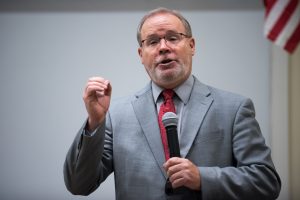How Will Teaching Communication Change Over the Next 10 Years?
 By Dr. Michael Weigold
By Dr. Michael Weigold
Associate Dean, Undergraduate Affairs and Enrollment Management
Forecasting is a dangerous game in education. Far from being isolated “ivory towers,” public universities are at the center of government regulation, public opinion, changing student demographics, accrediting regulations, and evolving industries. That said, some trends, many of which have been underway for several years now, offer guidance as to how teaching will evolve over the coming years.
Data and Accountability
Dating to the early days of the Obama administration and its creation of “scorecards,” a reliance on data for assessing effectiveness continues to this day and will become even more important in the future. Whether it is timely graduation, meeting student learning outcomes, demonstrating institutional effectiveness, or determining the success of diversity initiatives, data are part of the daily operation of every college.
Our college is involved in extensive data collection that goes above and beyond that required by UF through the use of our graduating senior survey. This survey provides insights into the experiences, classes, people, and student backgrounds that predict not only graduation but also employment on graduation, salary in first job, grad school admission, and overall satisfaction.
How does this relate to teaching? The survey allows us to determine what classes, skills, immersion experiences, independent studies, student backgrounds, and internships best predict success. From that, we can better tailor the curriculum, and individual courses, to ensure greater student thriving. Tomorrow’s teachers will routinely consult dashboards to better understand what experiences are accelerating student learning and what experiences are hindering it.
Practical or Theoretical? The Future is in Both
Primarily a professional school for undergraduates, CJC has traditionally emphasized real-world experience, the essentials of professional practice, and a deep appreciation of the industries that we serve. In recent years, we’ve also ensured that students understand underlying processes that inform these practices. Media channels, software, and digital technologies will continue to evolve, but the processes of learning, attitude change, and behavioral modification will not. This suggests that the ideal background of tomorrow’s communication teachers will reflect both social and behavioral science and real-world experience.
Doing Great Things
Contemporary students are anxious to lead and are motivated to address real-world challenges. These motives dovetail perfectly with the reality that the best way to incorporate new knowledge is to apply it. Immediately.
Traditional “book learning” remains important, but effective teachers know that such learning evaporates quickly if students are not given the opportunity to practice what they’ve learned. Today’s best teachers spend less time on information dissemination (which can be dealt with via effective texts, videos, educational games, etc.) and more on coaching, mentoring, and feedback on student exercises, projects, and simulations. By encouraging students to produce real, meaningful, challenging work products, teachers help students to master important skills, grow in confidence, and offer value to future employers.
In my opinion, the best measure of a course’s effectiveness is a surprisingly simple metric: what are students able to do as a result of taking the class? Universities of today celebrate sports coaches who train and inspire their athletes to win championships. In the same way, teachers who can cultivate important, challenging, and relevant competencies offer greatest value to the university of the future.
